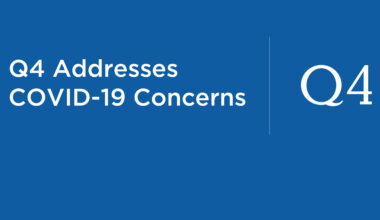Last month, Q4 had the pleasure of adding Colleen Johnston, former CFO of TD Bank, to our Board of Directors and will be serving as an independent director to guide the company’s growth and evolution. Not long after joining, I had the opportunity to connect with Colleen to learn about her past experience working as a CFO for two of Canada’s largest banks (Scotiabank and TD Bank), her decision-making process when asked to join a board, and her advice for today’s IR professionals.
Can you tell us about your career journey and what you enjoyed most?
After university, I became a professional accountant but I decided very early on that I wanted to go into business. During my 35 year career, I worked largely in financial services, having worked at TD for 14 years and Scotiabank for 15 years. Within a year of joining TD Bank, I was appointed CFO in 2005, which was just an incredible opportunity.
Of course, a key component of the CFO role is investor relations. Right out of the gate, I found the concept of having a public lens watching everything I do and evaluating my knowledge of the company or my ability to go deep on the numbers while still speaking strategically absolutely terrifying. Adding to that, the reality is that TD bank is a very important stock. It’s very closely followed at the retail and institutional level in Canada, and globally. So it’s a big arena, making it very important to tell that story well.
It wasn’t long after I was appointed as CFO that our CEO, Ed Clark, said “I’d like to make IR a competitive advantage for TD”. Initially, I had no idea what he meant by that, but I of course agreed. So, we embarked down the road of creating a culture of excellent IR at TD. What does that mean? It’s really about being very responsive, accessible, and being value-added in our philosophy when engaging with investors and analysts.
To deliver on this, it was about finding a really great leader as the new head of IR and adopting excellent IR as a part of our culture at TD. It wasn’t just for the small team in IR or the folks in Finance, but really across the entire bank. If a client had a question about the mortgage business or a recent regulatory change, people would really drop everything to help and were really focused on our investors and analysts. Which really served us well as an organization.
We also really had growth aspirations as an organization, so we made the decision to tap into other markets to deepen the demand for TD shares south of the border and across the globe. That was a big part of my role as CFO and executive team member.
Ultimately, IR became a huge part of my job and one of the things I really enjoyed most about the role. That, and leading a great team, working with a fantastic senior team at the bank, and driving results. As my career grew, I focused more on leadership and people, as well as vision and strategy.
Since your retirement, you’ve been appointed to a number of boards. Can you tell us about your decision to become a board member?
There’s a lot of people who get to my stage of their professional career and boards are kind of like the holy grail. It’s something you can do and get involved or stay involved professionally with great companies while providing an opportunity to share your experience and knowledge, but also a way to contribute to these organizations.
That’s not how I approached it. I went in with a completely open mind as to what I was going to do when I retired. I knew I wasn’t going to be laying on the beach or golfing, but I kept an open mind as to what I would do post-TD. And while it sounds a little bit lofty, my thought was “I’ve got all this great experience, what can I do to help change the world in my own way?”
I’ve looked at things that are purpose-driven, but also things that are interesting. Ultimately, after considering a few different options, I made the decision to pursue becoming a board member. And with my background, especially with having been a CFO, I was approached to consider a number of boards – and I would in all cases think about whether or not it was appealing to me.
It’s also a really good chance for me to learn. For example, I’m on the board at McCain, which is an agriculture and food business. And I do know I like french fries, but what do I know about a business like that? But when I got in, I realized that a lot of topics discussed on the board are very standard to every business, like leadership, management issues, financial reporting, mergers and acquisitions. However, there is also a chance to get to learn and deepen your knowledge of the business – and that’s really fun. To see these great companies and how they do business, how they care about their stakeholders. So the learning part has been really fabulous.
Before joining a board, what factors do you consider? And what attracted you to Q4?
I had some very simple criteria. I would say; is it an organization that I admire? Do I like the business and the industry? As there were certain sectors I just wasn’t interested in. And while you can get interested in any type of business, once you get on a board you have to become more of a deep sector expert. So I ask myself if it’s appealing for me? Am I needed as a board member? And can I add value?
And you want to make sure that you’re working with people you like on the Board – and that isn’t to say that it has to be a total collegial environment where everybody wants to get along all the time. It’s good to have a positive environment, but one where you can have challenging discussions and where management can benefit from being pushed a little by the board.
With Q4, the board opportunity came onto my radar, and frankly I absolutely love what the company is doing. I think Darrell is an absolutely fantastic executive. The team that I’ve met so far and what I’ve learned about the company; this really is the new frontier of investor relations. And I love the model and how it’s being built. In a lot of ways, it’s democratizing IR and making IROs smarter and more effective. C-suite executives as well, including CEO and CFO. So I am very excited about Q4’s model, it’s leadership team, and where the company is going and I’m delighted to be a part of the continuing success of Q4.
Looking at those in the IR role today, what advice would you give them in terms of navigating today’s market and delivering on expectations?
Some people say that if you deliver good results, that will pave the way. But I’m a believer that for any organization, as good as you can be, you’re always going to have ups and downs. And you’re going to have things that work really well and things that don’t work perfectly. And I would say having the benefit of the doubt, and having investors really understand your story, getting to know management, making sure you’re accessible maybe when things don’t go perfectly is really about building the loyalty of your shareholder base.
A lot of my experience goes back to the financial crisis which really came to a head in 2008. And while it’s a different crisis this time, the elements of a crisis are somewhat similar. Having gone through the financial crisis, and bank stocks took a beating and there was uncertainty around the future of banks and their stability. So, that was when Ed Clark and I decided to double down on investor relations. At a time when a lot of companies said “I don’t know what’s going on here, we don’t know what the future holds, we don’t have all the answers for what our investors and analysts are looking for” and retreated from stakeholders a little bit, we decided to do the opposite.
We said “look, we are now going to create more time in our calendars for outreach to our investors and analysts.” My rule of thumb in life is to always put yourself in the other guy’s shoes. For example, you’ve got a PM out there and their portfolio values have been hammered. They’ve got clients who are not happy and the clients have a lot of questions. So get out there and have those conversations with your contacts and share observations or theories on where this is going. Talk about your own management philosophy; what are you worried about most, how are you coping, how are you seizing opportunities, where are you playing offence/defense. All those kinds of things. Even though you don’t have a completely clear picture of where this is going, get out there and share your story.
None of us know exactly where the world is going. We don’t know where this virus is going, if there’s going to be a vaccine, what new protocols may be put in place, what the new consumer behavior is going to be, the questions go on and on. No one has a crystal ball here. But get out and talk about what you’re doing in your own organization. That would be my most important advice during this crisis; double down on IR, despite the uncertainty and not having clear answers in all cases. Your investors and analysts will be very indebted to you, and it will really change your brand in the marketplace.
Learn more about Colleen and her addition to the Q4 Board of Directors here.


